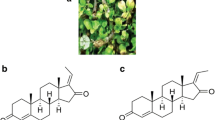Abstract
Cancer remains a global major health burden. Activation of certain signaling pathways such as Janus kinase (JAK)/signal transducer and activator of transcription (STAT) is found to be an important regulatory defect present in most cancerous cells amongst other factors. The signaling of Cytokine causes the activation of “STAT proteins” in regulating the proliferation and differentiation of cells, more so its role in the modulation of targeted genes cannot be over emphasized. Phytochemicals play significant role in the inhibition of the JAK/STAT signaling in antigen-presenting cells by targeting different pathways. In this review, Resveratrol, cucurbitacin, curcumin, Epigallocatechin-3-gallate and others are promising phytochemicals discussed. Extensive studies have now shown that phytochemicals perform crucial functions in inhibiting the multiplication and proliferation of cancerous cell thus providing novel channels for targeting cancer therapeutically.
Similar content being viewed by others
References
Aaronson DS, Horvath CM (2002) A road map for those who don’t know JAK-STAT. Science 296(5573):1653–1655
Ahles TA, Saykin AJ (2007) Candidate mechanisms for chemotherapy-induced cognitive changes. Nat Rev Cancer 7:192–201
Arumuggam N, Bhowmick Neil A, Rupasinghe H, Vasantha P (2015) Phytochemicals targeting JAK/STAT Signaling and IDO expression in Cancer. Phytother Res Rev 29(6):805–817
Bousoik E, Montazeri Aliabadi H (2018) “Do we know Jack” about JAK? A closer look at JAK/STAT signaling pathway. Front Oncol 8:287
Darnell J, Kerr I, Stark G (1994) Jak-STAT pathways and transcriptional activation in response to IFNs and other extracellular signaling proteins. Science 264:1415–1421
Ferlay J, Soerjomataram I, Ervik M, Dikshit R, Eser S, Mathers C, Rebelo M, Parkin DM, Forman D, Bray F (2013) Cancer incidence and mortality worldwide. International Agency for Research on Cancer: GLOBOCAN 2012 v1.0. Available from http://globocan.iarc.fr. Accessed on 15/07/2014
Fujiki H, Sueoka E, Ravangkan A, Suganuma M (2017) Human cancer stem cells are a target for cancer prevention using (−) epigallocatechin gallate. J Cancer Res Clin Oncol 143(12):2401–2412
Groner B, von Manstein V (2017) Jak Stat signaling and cancer: opportunities, benefits and side effects of targeted inhibition. Mol Cell Endocrinol 451:1–14
Hanahan D, Weinberg RA (2011) Hallmarks of cancer: the next generation. Cell 144:646–674
Hayashi Y (1992) Overview of genotoxic carcinogens and nongenotoxic carcinogens. Exp Toxicol Pathol 44:465–471
Horvath CM (2000) STAT proteins and transcriptional responses to extracellular signals. Trends Biochem Sci 25:496–502
Jemal A, Bray F, Center MM, Ferlay J, Ward E, Forman D (2011) Global cancer statistics. CA Cancer J Clin 61(2):69–90
Khan F, Niaz K, Maqbool F, Hassan FI, Abdollahi M, Kalyan C, Venkata N, Nabavi SM, Bishayee A (2016) Molecular targets underlying the anticancer effects of quercetin: an update. Nutrients 8:529
Loveth OL, Christian H, Raphael NA, Wen Z, Lianwen Q (2017) Targeting the key factors of inflammation in cancer: plant intervention. Int J Clin Exp Med 10(12):15834–15865
Luch A (2005) Nature and nurture—lessons from chemical carcinogenesis. Nat Rev Cancer 5:113–125
Luo NA, Balko JM, Badve S, Kumar GL (2019) Role of JAK-STAT pathway in cancer signaling. In: Badve S., Kumar G. (eds) Predictive biomarkers in oncology. Springer, Cham. pp 311–319 https://doi.org/10.1007/978-3-319-95228-4_26
Messina JL, Yu H, Riker AI, Munster PN, Jove RL, Daud AI (2008) Activated Stat-3 in melanoma. Cancer Control 15(3):196–201
Nandakumar V, Singh T, Katiyar SK (2008) Multitargeted prevention and therapy of cancer by proanthocyanidins. Cancer Lett 269:378–387
O’Shea JJ, Schwartz DM, Villarino AV, Gadina M, McInnes IB, Laurence A (2015) The JAK-STAT pathway: impact on human disease and therapeutic intervention. Annu Rev Med 66:311–328
Oliveira PA, Colaço A, Chaves R, Guedes-Pinto H, DeLa-Cruz L, Lopes C (2007) Chemical carcinogenesis. Ann Braz Acad Sci 79(4):593–616
Pencik J, Pham HT, Schmellerl J, Javaheri T, Schlederer M, Culig Z et al (2016) JAK-STAT signalling in cancer: from cytokines to non-coding genome. Cytokine 87:26–36
Pitot HC, Goldsworthy T, Moran S (1981) The natural history of carcinogenesis: implications of experimental carcinogenesis in the genesis of human cancer. J Supramol Struct Cell Biochem 17:133–146
Seif F, Khoshmirsafa M, Aazami H, Mohsenzadegan M, Sedighi G, Bahar M (2017) The role of JAK-STAT signaling pathway and its regulators in the fate of T helper cells. Cell Commun Signal 15:23
Senggunprai L, Kukongviriyapan V, Prawan A, Kukongviriyapan U (2014) Quercetin and EGCG exhibit chemopreventive effects in cholangiocarcinoma cells via suppression of JAK/STAT signaling pathway. Phytother Res 28:841–848
Siegel R, DeSantis C, Virgo K et al (2012) Cancer treatment and survivorship statistics. CA Cancer J Clin 62:220–241
Thomas SJ, Snowden JA, Zeidler MP, Danson SJ (2015) The role of JAK/STAT signalling in the pathogenesis, prognosis and treatment of solid tumours. Br J Cancer 113(3):365–371
Vlahopoulos SA, Cen O, Hengen N, Agan J, Moschovi M, Critselis E, Adamaki M, Bacopoulou F, Copland JA, Boldogh I, Karin M, Chrousos GP (2015) Dynamic aberrant NF-κB spurs tumorigenesis: a new model encompassing the microenvironment. Cytokine Growth Factor Rev 26(4):389–403
Wilks AF et al (1991) Two novel protein-tyrosine kinases, each with a second phosphotransferase-related catalytic domain, define a new class of protein kinase. Mol Cell Biol 11:2057–2065
Zhang J (2012) Can we discover “really safe and effective” anticancer drugs? Adv Pharmacoepidemiol Drug Saf 01(05)
Zhao Y, Hu X, Zuoc X, Wang M (2018) Chemopreventive effects of some popular phytochemicals on human colon cancer: a review. Food Funct 9:4548–4568
Author information
Authors and Affiliations
Corresponding author
Editor information
Editors and Affiliations
Rights and permissions
Copyright information
© 2021 Springer Nature Singapore Pte Ltd.
About this entry
Cite this entry
Molehin, O.R. et al. (2021). Modulation of JAK/STAT Pathways in Cancer by Phytochemicals. In: Chakraborti, S., Ray, B.K., Roychowdhury, S. (eds) Handbook of Oxidative Stress in Cancer: Mechanistic Aspects. Springer, Singapore. https://doi.org/10.1007/978-981-15-4501-6_88-1
Download citation
DOI: https://doi.org/10.1007/978-981-15-4501-6_88-1
Received:
Accepted:
Published:
Publisher Name: Springer, Singapore
Print ISBN: 978-981-15-4501-6
Online ISBN: 978-981-15-4501-6
eBook Packages: Springer Reference Biomedicine and Life SciencesReference Module Biomedical and Life Sciences




